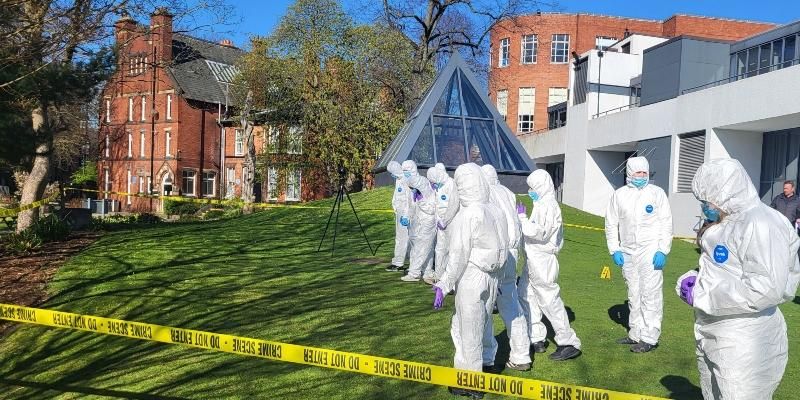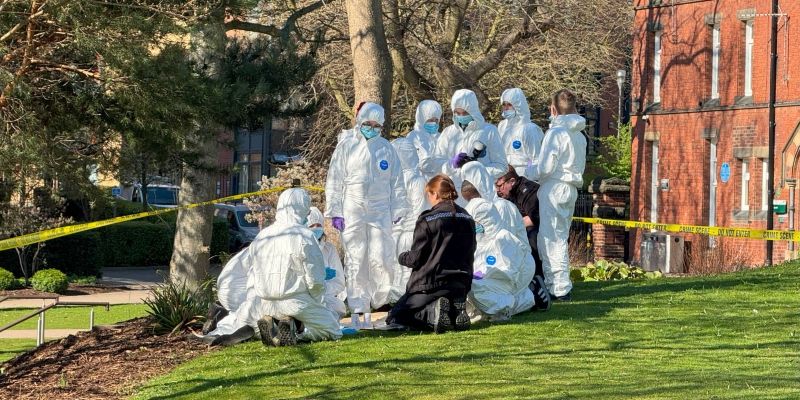
Schoolchildren investigated a mocked-up ‘crime scene’ on the University of Leeds campus as part of a knife crime reduction campaign.
The crime scene was staged for youngsters to learn about the intricate and painstaking forensics work that is carried out at the location of a serious crime.
The Junior Detectives scheme involves a week of activities put together by West Yorkshire Police to raise awareness about the dangers of carrying a knife. The activities were supported by University staff and student mentors.
The initiative was developed by the Police working with partners including the University of Leeds, the NHS, Leeds Crown Court and Notre Dame Catholic Sixth Form College in Leeds.
The programme, involving 12 and 13-year-olds from Outwood Grange Academy, Outwood Academy Hemsworth, Ossett Academy and Horbury Academy in the Wakefield district, follows the success of the project in Leeds and Bradford last year.
The crime scene was created on a grassed area close to the pyramid on the Leeds campus. Other facilities included an A&E ward in the Medical School’s simulation suite, where pupils heard about traumatic injuries dealt with by surgeons, and a police interview in the School of Law’s Liberty building where they discovered how investigations are carried out.
The university’s HELIX ‘Makerspace’ was used to develop ideas with pupils trying out state-of-the-art VR equipment.
As part of the initiative, the year 8 students followed a fictional scenario from first report to the police through to conclusion at Leeds Crown Court, where they met His Honour, Judge Christopher Batty.
I think they are getting a lot out of it and appreciate it. It has been good for me too to experience the educational side of volunteering.
Six Law School students from the University also met and quizzed the Judge and two King’s counsellors during an hour-long session.
Ria Nahar, in her second year studying Law, said: “I signed up as a student mentor and ended up volunteering for the whole week. It was fascinating.
“It has been organised so well and I think the students really enjoyed it. They are asking lots of questions and taking copious notes. I think they are getting a lot out of it and appreciate it. It has been good for me too to experience the educational side of volunteering.”
The programme culminated in a celebration event hosted by Wakefield Trinity RLFC at their Belle Vue Stadium where the pupils were awarded the status of ‘anti-knife crime champions’.
Sarah Wenham, Senior Faculty Employability Manager for Social Sciences, worked alongside Peter Homer, a police officer from West Yorkshire Police, to develop the concept. They felt that knife crime was an urgent and complex issue that needed to be addressed through education.
Sarah said: “It is fantastic hands-on experience both for the schoolchildren and for our students. Due to its impact, we are now looking to develop this type of experiential learning into a credit-bearing module for students at Leeds.”

Dr Steve Montagu-Cairns, Deputy Pro-Dean: Student Education, Faculty of Social Sciences at the University of Leeds, said: "By opening up our state-of-the-art facilities, we want to play our part in raising awareness among young people of knife crime and criminal exploitation, whilst at the same time providing an opportunity for those young people to experience time on campus, raising their aspirations of applying to university.
"Our staff and students will support the school pupils as mentors and event organisers, providing them with valuable experience of how our police and court system approach this critical societal issue.
"We are extremely proud of this crucial partnership with West Yorkshire Police and hope to extend it in the future to enable more of our University of Leeds students to be involved through their degree programmes."
Wakefield District Commander Chief Superintendent Stuart Bainbridge said: “Knife crime is not an easy subject to talk about, but it is something that we must have honest and frank conversations about if we are going to educate and deter young people from carrying a knife.
“This programme is not just about educating a select group of young people though, but about giving them the knowledge and skills to be advocates of the anti-knife crime message among their peers and wider society."
Further information
For further information, please contact Jane Lewis in the University of Leeds press office at j.lewis3@leeds.ac.uk or pressoffice@leeds.ac.uk.